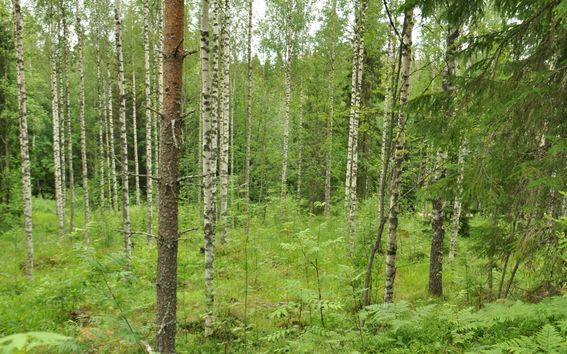Albedo matters for the climate and forestry can have an impact on it

Vegetation cover and land-use changes alter the surface albedo, or the extent to which incoming solar radiation is reflected back to the atmosphere and outer space. Even though land surface albedo is a critical variable affecting our climate, it is still among the main uncertainties of the radiation budget in current climate modelling. Aalto University’s soon ending project funded by the Academy of Finland examined how changes in boreal forests affect albedo and its seasonal variation.
The connection between the on-going environmental changes in the boreal zone and forest albedo has been unknown. Especially important in terms of climate is to assess how forest management actions and natural changes in forests affect albedo. On the other hand, it is critical also to examine how forest albedo and forest productivity are interconnected.
Seasonal dynamics of forests were measured from space
The project developed an interdisciplinary methodology for assessing boreal albedo and its seasonality based on forest inventory data, forest reflectance modelling and Earth observation data. Field reference data was collected from Finland, Estonia, Sweden, Russia and Alaska (United States).
In the northern forests, seasonality of albedo is large: the albedo can vary between 7 and 80% depending on the season. Especially the snow cover and the duration of the snow-covered season have an important role in albedo regulation. Besides this, species composition, forest density and forest floor vegetation affect forest albedo.
Forestry matters for albedo
The research results demonstrated that forest management can affect boreal forest albedo, but the local circumstances have to be taken into account. Forest density and species composition influence albedo differently during snow-covered and snow-free seasons. Therefore, the duration of the snow-covered season has a great impact on how forest management affects the mean annual albedo. For example, in the southern boreal region, increasing the fraction of broadleaved species in coniferous forests and favoring mixed forests can increase forest albedo without compromising productivity. In the northern boreal region, on the other hand, the importance of the tree species is not as obvious, and the albedo can be best increased by decreasing the density of the forests. However, as forest density is closely connected to productivity, it is important to take into account also other aspects of forestry such as carbon sequestration and the economic value of forests.
With the knowledge of consequences of forest management practices on the albedo, best-practice recommendations for forest management in future climate mitigation policies will become more justified. In terms of climate, favoring mixed forests in the southern boreal zone can be recommended. Also, the importance of albedo for the climate increases towards the north. This is why in the boreal zone, acknowledging also the role of albedo in forestry is an essential climate action.
More information:
Professor Miina Rautiainen
miina.a.rautiainen@aalto.fi
+358504010780
Postdoctoral researcher Aarne Hovi
aarne.hovi@aalto.fi
+358504064147
Read more news

Aalto University is introducing ORCID’s Researcher Connect service
Aalto University is introducing ORCID's Researcher Connect service, which facilitates information transfer between researchers' ORCID profiles and the university's research information management system, ACRIS.
Nature of Process: Exhibition by the students of the ‘Personal Exploration’ Course
Nature of Process is a multi-material exhibition of 14 Master´s students of Aalto ARTS
Doc+ connects research impact with career direction - join the events!
Doc+ panels have brought together wide audiences in February and continue in March with two events to discuss doctoral careers and their diversity.






